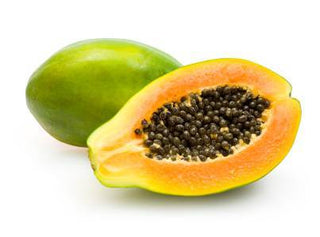(Carica Papaya)
Reputably referred to by Christopher Columbus as the “fruit of the angels”, papayas have long been revered for their sweet, musky taste and ample health benefits.
Papayas are spherical fruits with a buttery flesh, similar to that of a soft melon. Papaya skin ranges in color from green–orange to red–yellow. The internal flesh is usually a deep orange with possible pink or yellow tones. The inner cavity of the papaya contains black, round seeds that are edible but have a peppery, somewhat bitter flavor.
Two types of papaya are generally available: Hawaiian and Mexican. Hawaiian papayas are pear shaped, about 7 inches in length and weigh about a pound. These papayas are most commonly found in grocery stores. The Mexican variety has a less intense flavor and is much larger – these fruits can grow up to 15 inches and weigh nearly 20 lbs!
Papayas are native to Central America. Extremely sensitive to frost, papayas flourish in tropical climates and have been successfully cultivated in Hawaii since the early 21st century. Today, the largest commercial producers include the United States, Mexico, and Puerto Rico.
Nutrition
A cup of papaya cubes contains just 55 calories and boasts 3 grams of fiber.
Papayas are packed full of vitamins, most notably vitamin A and vitamin C, making this fruit a great source of antioxidants. One cup of papaya contains 1,531 IU of vitamin A, primarily from beta cryptoxanthin, beta carotene and lutein/zeaxanthin. In this single serving of fresh fruit, one gets 33% of the recommended daily intake for vitamin A. Papayas contain 85.6 mg of vitamin C or nearly 150% of the suggested daily intake. Papayas are also a good source of folate, providing 53.2 mg or 13% of the suggested daily intake.
When it comes to mineral content, papayas are a good source of potassium, providing 360 mg or 10% of the suggested daily intake.
Health Benefits
Papayas are perhaps best known for papain, a digestive enzyme. Papain, along with a second enzyme, chymopapain, has been shown to help lower inflammation and to improve healing from burns. Papain is often used to treat trauma like sports injuries and has been proved effective in relieving symptoms of certain allergies.
Those with a latex allergy will most likely be allergic to papayas and should avoid papayas completely or enjoy the fruit cooked, as this deactivates the allergy causing enzymes.
Selection and Storage
Although still considered quite exotic, papayas can be found at your local grocer year-round. Papayas peak in early summer, so if you haven’t enjoyed one yet, now is the best time to go make your selection.
When choosing a papaya, look for a fruit that is at least partly yellow – these will take a few days to ripen. If you want to enjoy your papaya right away, select a fruit with reddish-orange skin and slightly soft to the touch. Avoid papayas that are bruised, shriveled, or soft on the stem end.
Papayas that are green or hard should not be purchased unless you plan to cook them or use them for cold Asian salads or curries. Green papayas are immature and will not ripen properly. A ripe papaya can be stored in a plastic bag in the refrigerator for up to a week but is best enjoyed within a few days.
Recipes
Like all fruit, papaya is best enjoyed raw without the skin or seeds. When adding to a fruit salad, add papaya last to avoid creating mushy fruit.
When used as part of a larger meal, papayas add an incredible richness and texture to any dish. Papaya is especially delicious used as a marinade for your favorite red meat - the protein digesting enzymes found in papaya make it an excellent meat tenderizer.
Sliced papaya fanned over your favorite fish makes for a simple and elegant meal. For delicious take on this combination try Grilled Tuna with Papaya Chutney – sure to impress guest but easy enough for every day.
For a light, refreshing, summer soup try this easy Papaya Lime Soup.
For a sweet take on salsa perfect for dipping those fresh sliced veggies, try Papaya Black Bean Salsa.
Fun Facts
Papayas are very susceptible to the fruit fly and are prone to the papaya ring spot virus. Because this virus is capable of wiping out the entire papaya industry, papayas have been genetically modified to be resistant to the virus. Today, over 80% of papayas are genetically modified and there is still no organic method of controlling the ring spot virus.

